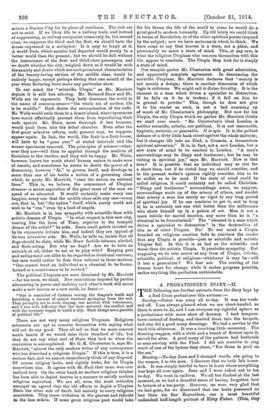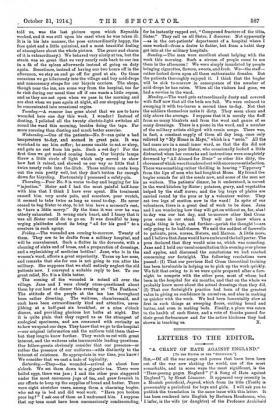A PROBATIONER'S DIARY.—II.
THE following are further extracts from the diary kept by a Red Cross probationer this autumn :— Sunday.—Sister was away all to-day. It was her week- end off. I am always pleased when we are short-banded, as there is more to do, and I can overpass my rightful sphere as a probationer with more show of decency. I took tempera- tures instead of dusting, and charted them into the bargain, and also did a good many dressings. We had a service in the ward this afternoon. It was a touching little ceremony. The dressing-waggon, with a cloth and a bunch of flowers upon it, served for altar. A good many of the patients had husbands or sons serving with the Fleet. I did not contrive to sing much of one of the hymns they chose, "For those in peril on the sea."
Idorulay.—To-day Jane and I changed wards, she going to the women, I to the men. I discover that we both felt home- sick. It was simply hateful to have to learn where everything was kept all over again. Jane and I were asked out to tea to-day. We went in uniform. We all but funked at the last moment, as we had a dreadful sense of having forgotten how to behave at a tea-party. However, we were very glad that we had gone, for we discovered that our hosts possessed no leas than six fine Reynoldses, one a most beautiful unfinished half-length portrait of Kitty Fisher. (This, they
told us, was the last picture upon which Reynolds worked, and it was still upon his easel when he was taken ill. It is in his late manner, the pose extraordinarily happy, the face quiet and a little quizzical, and a most beautiful feeling of atmosphere about the whole picture. The grace and charm of it is extraordinary.) We behaved very nicely at tea, but the strain was so great that we very nearly rode back to our inn in a fit of the spleen afterwards instead of going on duty again. Sometimes, instead of having our two hours off in the afternoon, we stay on and go off for good at six. On those occasions we go hilariously into the village and buy acid-drops and unnecessary straps for our bicycle carriers. The shops, though near the inn, are some way from the hospital, too far to visit during our usual time off if one wants a little repose, and as they are not open when we pass in the morning and are shut when we pass again at night, all our shopping has to be concentrated into occasional orgies.
Tuesday.—A rumour has gone about that we are to have wounded here one day this week. I wonder ! Instead of dusting, I polished all the twenty electric-light switches all round the ward this morning, besides doing the taps. Far more amusing than dusting and much better exercise.
Wednesday.—One of the patients—No. 8—ran quite a bad temperature to-day, and seemed in great pain. It was wretched to see him suffer ; he seems unable to eat or sleep, and gets no rest from his pain. Such a wet day ! For the first time we got soaked coming home. Our bicycle lamps threw a little circle of light which only served to show how fast it rained, and showed us our way so little that I twice nearly rode into the ditch. These uniform coats keep out the rain pretty well, but they don't button far enough down for bicycling. Fortunately I possessed a safety-pin.
Thursday.—Poor No. 8 is worse to-day and begging for his "injection." Sister and I had the most painful half-hour with him that I think I have ever spent. His treatment caused him very acute pain, and somehow, poor wretch, it seemed to take twice as long as usual to-day. He never ceased to beg Sister to stop, to let him have a moment's rest, to "have a little mercy." By the time it was over he was utterly exhausted. It wrung one's heart, and I fancy that it was all Sister could do to go on. It was dreadful to keep urging platitudes about its being "all for his good" to a creature in such agony.
Friday.—The wounded are coming to-morrow. Twenty of them. They are to be drafts from a military hospital, and will be convalescent. Such a flutter in the dovecote, with a cleaning of sinks and of brass, and a preparation of dressings, and a replenishing of medicine bottles! Jane, who is in the women's ward, affects a great superiority. Turns up her nose, and remarks that she for one is not going to run after the military. She supposes that we shall entirely neglect the old patients now. I conveyed a suitable reply to her. To our great relief, No. 8 is a little better.
The coming of the wounded is noised all over the village. Jane and I were closely cross-questioned about them by our host at dinner this evening at The Feathers.' The attitude of the people at the inn has throughout been rather diverting. The waitress, chambermaid, and cook have been extraordinarily kind and attentive, never jibbing at a half-past six breakfast, or a nine o'clock dinner, and providing glorious hot baths at night. But it is quite plain that they regard us as the strangest of zoological specimens, and are consumed with curiosity as to how we spend our days. They know that we go to the hospital —our original information and the uniform told them that— but they long to know further. They watch us eat with great interest, and the waitress asks innumerable leading questions. Our fellow-guests obviously consider that our presence—or rather the presence of our uniforms—adds distinctly to the interest of existence. So appropriate in war time, you know ! We consider that we cast a halo of topicality.
Saturday.—They—the wounded—arrived at about four o'clock. We set them down to a gigantic tea. There were boiled eggs, there was jam; I and the other pros staggered under the most enormous jugs of tea, and grew feverish in our efforts to keep up the supplies of bread and butter. There were eight stretcher cases, among them a charming bugler, who sat up in bed and did wool work. "Have you broken your leg ? " I ask one of them as I undressed him. I suppose that my tone must have been unconsciously condescending,
for he instantly rapped out, "Compound fracture of the tibia, Sister." They call us all Sister, I discover. Not apparently —as in the out-patients' department of a hospital where I once worked—from a desire to flatter, but from a habit they get into at the military hospitals.
Sunday.—The men were excellent about helping with the work this morning. Such a stream of people come to see them in the afternoon ! We were simply inundated by people bringing cigarettes, flowers, sweets, and fruit. We—the staff— rather looked down upon all these enthusiastic females. But the patients thoroughly enjoyed it. I think that the bugler will be sick to-morrow in consequence of the number of acid-drops he has eaten. When all the visitors had gone, we had a service in the ward.
Monday.—The ward gets extraordinarily dusty and covered with fluff now that all the beds are full. We were reduced to sweeping it with tea-leaves a second time to-day. Not that the soldiers themselves make it dirty. They seem clean and tidy above the average. I suppose that it is merely the fluff from so many blankets and from the wool and gauze of so many dressings. There is a piano in the ward, and a number of the military artists obliged with comic songs. There was, in fact, a constant supply of them all day long, once only relieved by "My Home in Mayo," which is a "eerie." All the bad cases are in a small inner ward, so that the din did not matter, except to poor Sister, who occasionally looked a little distracted when her remarks and instructions were completely drowned by "All Aboard for Dixie" or other like ditty, the choruses of which were thundered out with enormous satisfaction. There was something rather thrilling in hearing " Tipperary " from the lips of men who had fought at Mons. My friend the bugler Bounds for all the meals now, and some of the men act as waiters. The patients' dinner, be it understood, is carved in the ward kitchen by Sister ; potatoes, gravy, and vegetables helped by the staff nurse; and the big trays of plates are carried round by the pros or by a volunteer waiter. They eat two legs of mutton now in the ward ! In spite of our volunteers, there is a great deal of work to be done. Jane and I are wondering how they will get on without us, for, alas! to-day was our last day, and to-morrow other Red Cross pros come in our stead. They will not know where a single thing is kept, and further—perish the thought !—are only going to be half-timers. We said the saddest of farewells to patients, pros, nurses, Sisters, and Matron. A little more, and I believe that Jane would have embraced the hall porter. The pros declared that they would miss us, which was consoling. Jane and I held our usual consultation this evening over plums and apples, and discussed the conclusions we had reached concerning our fortnight. The following resolutions were passed : (1) That our previous Red Cross theoretical training has been invaluable in helping us to pick up the work quickly. We felt that owing to it we were quite prepared after a fort- night to compete with the other pros, most of whom had been in the hospital for six months, and that on the whole we probably knew more about the actual dressings than they did. (2) That our fortnight's practice had been of the greatest value in giving us confidence in ourselves, and also in making us quicker with the work. We had been lamentably slow at first in such things as sweeping floors, cutting bread and butter, and even in making beds. Finally, a plum was eaten to the health of each Sister, and a vote of thanks passed for their great forbearance and for the active kindness they had



































 Previous page
Previous page